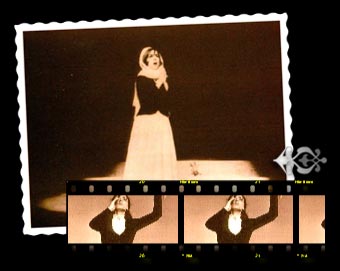Audio: Fayrouz & the Israeli Attack on Lebanon

Listen / Download an audio report on Lebanese singer Fayrouz. This report touches on the important historical and present day role of the famous Lebanese singer within the Lebanese identity. This report was produced during the height of the 2006 Israeli attack on Lebanon in Cairo, Egypt for a BBC World Service program, Global Hit. This excellent report features music from Fayrouz and live interviews from Egypt.
Broadcast Details from BBC World Service’s Global Hit:
The impact of the war on Lebanese civilians has outraged many in the Middle East. Some have chosen to give voice to their feelings, like this crowd of demonstrators in downtown Cairo, chanting slogans in support of Hezbollah and calling for the expulsion of the Israeli ambassador to Egypt. But many others have chosen to listen. To a sweet, familiar sound.
The songs of Lebanese diva Fayrouz are everywhere across the Arab world these days: on the radio, music video channels and private tape decks. Listening to Fayrouz has become a small act of solidarity with Lebanon.
Like many other of her songs, “To Beirut,” celebrates the beauty of Fayrouz’s homeland and the city she grew up in. Fayrouz is the stage name of Nouhad Haddad. It means “turquoise” in Arabic, and was suggested to her by a mentor, who once said her voice was like a precious stone.
Fayrouz grew up in a modest Christian Lebanese family, and she began her career as a singer on Lebanese National Radio in the late 1940s. By the ‘60s, she was one of the Middle East’s most famous performers. The 70-year-old chanteuse’s songs are familiar to a generation of Arab music lovers. And now, with this war, old and new fans are listening to them more than ever.
At a mall in Downtown Cairo, a clerk named Shadi sells tapes and CD’s.
Shadi: “There are a lot of people buying Fayrouz’s songs about Lebanon. “I Love You Lebanon,” “The True Lebanon is Coming,” her songs about Beirut. These songs have all sold out.”
Fayrouz’s songs were composed by her husband and his brother, the famous Rahbani brothers. They introduced ground-breaking new orchestral arrangements that mixed Eastern and Western styles. Many of Fayrouz’s songs are classic love ballads, like the popular tune, “Kaifak Enta,” or “How Are You?”
Other songs are laments on Lebanon’s troubled history. In “They Barricaded The Streets,” Fayrouz sings of life in Beirut during the 15-year Lebanese Civil War, with lyrics such as, “they barricaded the streets, they planted cannons and cleared the squares, I couldn’t find my house, no roses or fence.”
Fayrouz never left her homeland throughout the entire Civil War, which lasted from 1975 to 1990. This devotion to her homeland has helped make her something of a national treasure at home. And elsewhere in the Arab world, she has become synonymous with her country.
Shadi: “When we say Fayrouz, we say Lebanon. They’re one and the same thing. She’s to Lebanon what the pyramids are to Egypt.” That’s Shadi, the Cairo music vendor.
In fact, Fayrouz is such a potent symbol that when two private Egyptian telephone companies set up a line to collect humanitarian donations for Lebanon, they decided to play her music.
Callers pay about 15 cents a minute to hear Fayrouz’s voice. In its first week, the line logged more than thirty thousand calls. The money goes to Lebanese children.
Fayrouz was scheduled to sing at the 2006 Baalbek music festival this summer. The festival is Lebanon’s most famous musical event, and was the first place where Fayrouz performed live, back in 1957. It would have started on July 13, but the festival was cancelled when the bombs started falling. Now Fayrouz’s fans across the Arab world are left wondering when they’ll see her perform again.
For the World, I’m Ursula Lindsey, in Cairo.



this was so nice to hear at the end of working shift. i want to thank you for telling the people what and who is Fayrouz. but trust me, no one can know what is Fayrouz if he/she is not Lebanese. i think she shoud be on the FLAG.
Commentaire par Karim — 10 février 2007 @ 14:42i still didnt hear the report but am sure it will be more than great cause fayrouz is the true lebanon and the true lebanese idol of the lebanese cullture , fayrouz is sacret
Commentaire par mohammad jammoul — 23 mai 2007 @ 10:56